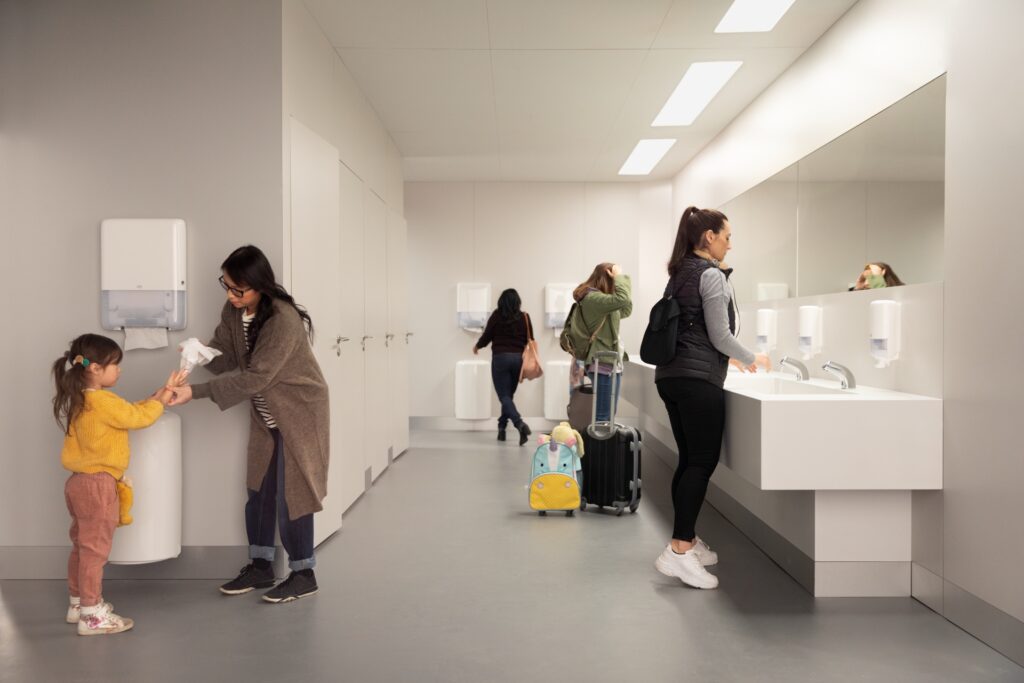Sensory hypersensitivity and urinary anxiety: many people prefer not to go to the bathroom – new research sheds light on this
One in two people is likely to experience hygiene problems in public restrooms, according to a survey by Tork, part of Essity. The research by the world’s leading professional hygiene brand asked more than ten thousand respondents in nearly a dozen countries about their experiences in public restrooms. Tork aims to identify problems in restrooms and offer solutions to improve hygiene.
 Public buildings and workplaces often only provide “accessibility” for people with physical limitations, such as wheelchair users – however, up to 95 percent of people with physical or cognitive disabilities face this problem as non-wheelchair users. Many special needs are not being adequately addressed in the design of restrooms, according to a recent Tork Insight Survey.
Public buildings and workplaces often only provide “accessibility” for people with physical limitations, such as wheelchair users – however, up to 95 percent of people with physical or cognitive disabilities face this problem as non-wheelchair users. Many special needs are not being adequately addressed in the design of restrooms, according to a recent Tork Insight Survey.
Sensory hypersensitivity and urinary anxiety: many people prefer not to go to the bathroom
According to the research, every second person may have problems using public restrooms because there is often a mismatch between people’s needs and the environment in the restrooms. Factors such as anxiety, increased sensitivity to noise and odors, “urinary anxiety”, or even concerns about cleanliness can lead to someone having difficulty or not being able to use a public restroom at all. However, there are solutions that can provide a solution for people with these problems.
“Eight out of ten people are concerned about the condition of public restrooms – this rate is even higher among those who have some kind of physical or cognitive disability,” said Géza Nagy, Director of Essity’s Professional Hygiene Business Unit. “And if a restroom is unable to meet various needs, it directly affects the perception of the given business, its reputation in the long term and thus its revenue. That is why the Hygiene for All principle is a fundamental element of our sustainability strategy. By prioritizing inclusive hygiene, we try to create a hygiene experience that is accessible to everyone – including the cleaners who keep these important spaces clean.”
Hygiene for All – the Tork philosophy. Tork says that creating a quiet, sensory-free environment, using large-capacity dispensers to ensure continuous availability of hygiene products, and keeping washrooms clean at all times are essential for achieving inclusive hygiene. It is important that paper towel, toilet paper and soap dispensers are easy to use even with reduced hand strength, and that the soap has a skin-friendly, dermatologically tested formula.
If the washroom is not clean, guests write a negative review: we are most sensitive to odors
The survey conducted on a sample of 11,500 people in 11 countries is fundamental evidence that people have high expectations when it comes to the cleanliness of public washrooms. 74 percent of respondents expect at least a medium to high level of hygiene – however, only 20 percent of washrooms meet this. 40 percent of the population is “very concerned” about the hygiene of public spaces, a figure that rises to 60 percent among those who suffer from germophobia.
Respondents most often avoid public restrooms because they consider them “unhygienic” (the number one reason), unpleasant odors (the second most common reason), lack of soap or toilet paper, and lack of privacy. A negative restroom experience can trigger strong emotional reactions and have concrete business consequences. When cleanliness expectations are not met, users feel disgust (27%), discomfort (26%) or frustration (22%) – and act accordingly:
- 28% of respondents have spent less time at a location due to the state of the restroom,
- 23% have cut back on eating and drinking to avoid using the restroom – directly reducing business revenue,
- 11% have warned their friends to avoid the location, 7% have even written a negative online review,
- One in four people have spent less time at work due to the state of the restroom, which reduces employee satisfaction and productivity,
- 15% have worked from home more often than they would have otherwise because they couldn’t find the restrooms at work appropriate – this hinders efforts to return to the office.
Related news
Related news
MOHU: 5,200 return points are in operation, but 47 larger settlements still do not have RE points – public “enema” machines may be introduced
🎧 Hallgasd a cikket: Lejátszás Szünet Folytatás Leállítás Nyelv: Auto…
Read more >GDP growth in OECD member countries slowed to 0.3 percent in the last quarter of last year
🎧 Hallgasd a cikket: Lejátszás Szünet Folytatás Leállítás Nyelv: Auto…
Read more >KSH: in the fourth quarter of last year, investment performance was 1.3 percent lower than a year earlier
🎧 Hallgasd a cikket: Lejátszás Szünet Folytatás Leállítás Nyelv: Auto…
Read more >








